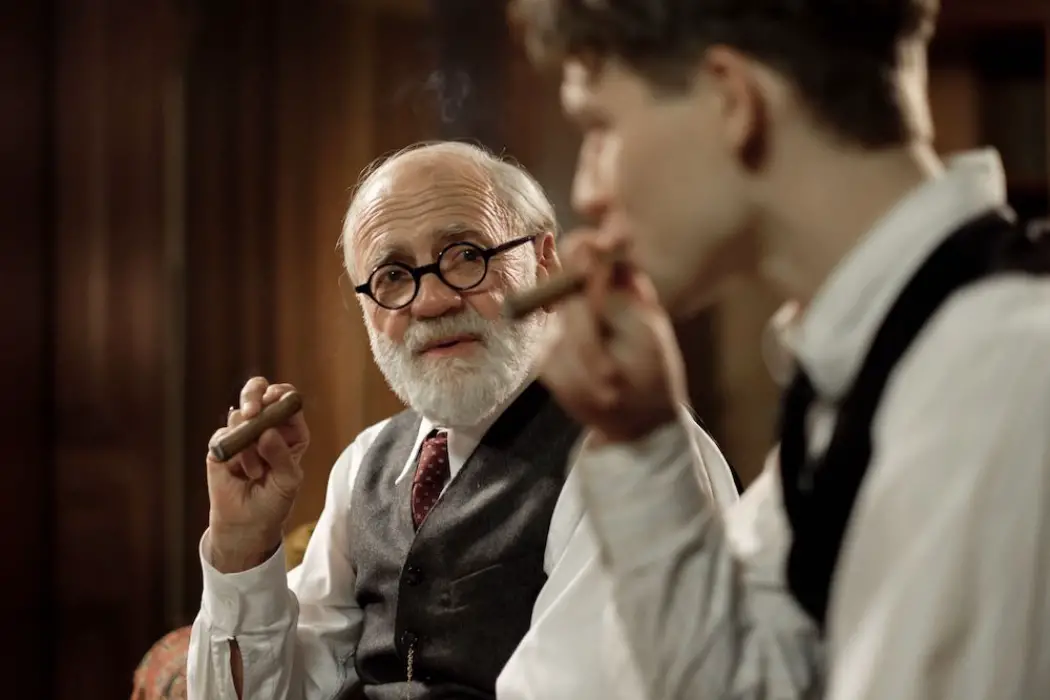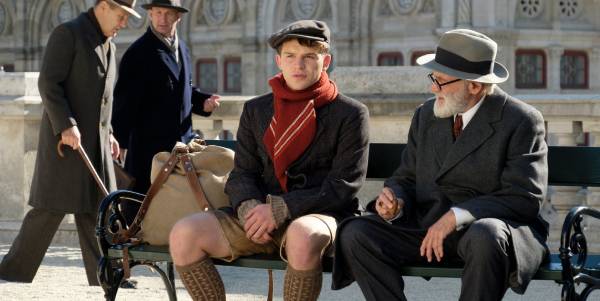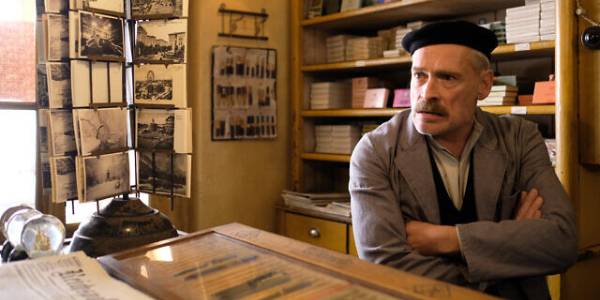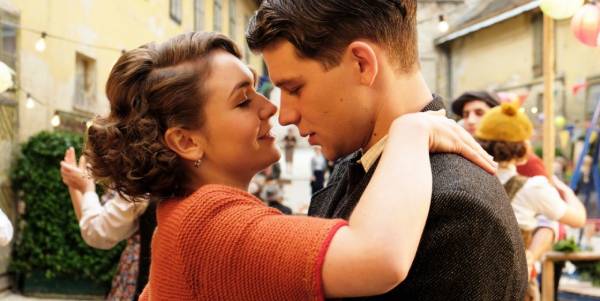THE TOBACCONIST: Love in the Time of Fascism

Former film student from Scotland turned writer and film reviewer.
Of all the events in the vast tapestry of human history, it feels as though the rise of Hitler’s Nazi party is the most significant. Time and again we return to its subject matter, examining what lessons it can teach us and consider the Holocaust from myriad different perspectives. This has given us many different cinematic touchstones over the years – some of which were major cultural events – and it doesn’t seem to be ending anytime soon. Only last year we had Taika Waititi‘s offbeat, sardonic take on Hitler in Jojo Rabbit and Terrence Malick‘s vision of an Austrian farmer objecting to Hitler’s conscription in A Hidden Life, and this year saw the release of the Jordan Peele produced Amazon series Hunters, focusing on a group of Nazi hunters in 1970s America. It seems there is still plenty more to be said about this time in history, especially as its message becomes more and more relevant in the troubled times we currently live in.

The Tobacconist (Der Trafikant in its native German) is one such film which sits comfortably, and quietly, alongside this slate of releases, boasting strong performances from Simon Morzé and the late, legendary Bruno Ganz. The former plays Franz, a young man from the idyllic lake town of Attersee sent to Vienna by his mother to work in a tobacconist shop. Franz is drifting aimlessly through life, preoccupied mostly by women and sex. He is a simple country-boy who’s naivety and inexperience is magnified in the wake of the historic Anschluss he walks into. While he is young and preoccupied with his inability to talk to women, around him grows fascism and intolerance as the Nazi occupation begins to take hold. Franz stares dumbly at all these changes he doesn’t understand; it’s one thing to not know how to seduce a woman, but why do people spray paint his shop with messages such as “Jew lover”?
Sometimes A Cigar is Just a Cigar
To guide him he has both Otto Trsnjek (Johannes Krisch), the tobacconist himself and one-time lover of Franz’s mother, and, excellently, Sigmund Freud – the father of psychoanalysis. Ganz plays Freud; an old, weathered man exasperated by the changes he sees in his hometown. This is Freud at the end of his life. He would flee to London shortly after and die there a year later. It is a muted, taciturn performance from Ganz, who is perhaps best known for his bombastic portrayal of Adolf Hitler in Oliver Hirschbiegel‘s Downfall and the panoply of internet memes it inspired. Here his voice often trembles with weakness, and his eyes fill with pity and sorrow. It’s a typically natural performance from Ganz, and sadly one of his final roles.
The crux of The Tobacconist – at least for the initial two thirds – focuses on Franz’s attempts to woo Anezka (Emma Drogunova), a young Bohemian girl he meets in the market square. The two share an evening together until Anezka disappears the following day, leaving a forlorn Franz to receive tweet-sized nuggets of wisdom from Freud such as that love is like water – you don’t need to understand it to jump in.
While Franz is pining and searching for Anezka, the city around him begins to change. Trsnjek, an open-minded and tolerant person who is opposed to the Nazi regime, begins to run afoul of the local Viennese who takes to the aforementioned spray painting alongside throwing dead chickens through the shop windows. Trsnjek, alongside his communist friend affectionately known as Red Egon, both make stands against the rising tide of hatred, with tragic results. All of this is punctuated with letters from Franz’ mother, Margarete (Regina Fritsch), describing the Nazi takeover of Attersee. This part feels unnecessary and a little too drawn out. While it’s interesting to counterbalance the struggles of a city in flux with its countryside counterparts, ultimately it adds very little to the story.

As well as the unnecessary letters are Franz’ frequent dream sequences. These are odd and disjointed – being dream sequences, of course – and result in a jarring contrast from the serious tone of the Nazi takeover of Vienna. In fact, the tone, in general, seems to be an issue here. The beautiful visuals, quirky backdrops which give the film a stage-play feel, and sometimes mawkish plotting feel in direct contrast to the story being told here. If Taika Waititi received criticism for not taking the Holocaust seriously enough, then surely The Tobacconist can be said to occupy the same territory. Alongside suicide and murder are sequences where a naked Franz cavorts in the Atterlee Lake, or a cabaret act in which Hitler is portrayed as an S&M loving sycophant. None of this is to say that these things don’t belong in the film, or even that they don’t add value to The Tobacconist, but rather that you’re not sure while watching it, what exactly they’re trying to say here. Aside from the moment with the S&M Hitler, and a blink-and-you’ll-miss-it scene where Franz and Anezka shoot cutouts of black Jim Crow style characters at a funfair, the racism is mainly off-screen. This undermines the idea of a Vienna that is becoming less tolerant.
Franz The Dreamer
Finally, Franz is given to Walter Mitty-esque daydreaming, different to the dream sequences, in which he imagines interactions going fairly differently than you might expect: in one such he approaches a man who has his arm around Anezka and threatens him. The scene then cuts back to reality and we see that man holding a knife to Franz. These scenes are quite funny, to be fair, and it becomes a game of discerning which scenes are likely to be a daydream before they are revealed, but once again it jars slightly with the serious nature of the Anschluss and its consequences.

It is really in the final third where the film’s weaknesses overcome it slightly. Events conspire to cast Franz in a position in which he must consider his own opinions and beliefs about the Nazi occupation. It is at this point the plot concerning Anezka is summarily dropped and the background politics of Vienna come to the fore. The denouement is slightly bittersweet because, although it is a satisfying result, it doesn’t feel earned enough. Franz’s character almost entirely changes quickly in order to serve the plot and it doesn’t work as well as it would have if we had seen a slower burn of this arc.
Conclusion
For all that, The Tobacconist is still a very watchable film. This is mainly to do with the quality of acting, which isn’t surprising in a film in which Bruno Ganz stars, and the gorgeous set design. It is an unapologetically quirky indie with a big heart and some very valid points to make about the insidiousness of fascism, certainly a lesson we should all learn right now. It might not be tonally coherent all of the time, or really know what it’s trying to say, but any film brave and brilliant enough to cast Bruno Ganz as Sigmund Freud dispensing advice to a lovelorn teenager ought to be given a chance.
There are so many films about the atrocities of the Holocaust. Which ones do you think consider merit? Let us know in the comments.
The Tobacconist was released on in USA on July 10, 2020 and is available on VOD.
Watch The Tobacconist
Does content like this matter to you?
Become a Member and support film journalism. Unlock access to all of Film Inquiry`s great articles. Join a community of like-minded readers who are passionate about cinema - get access to our private members Network, give back to independent filmmakers, and more.













